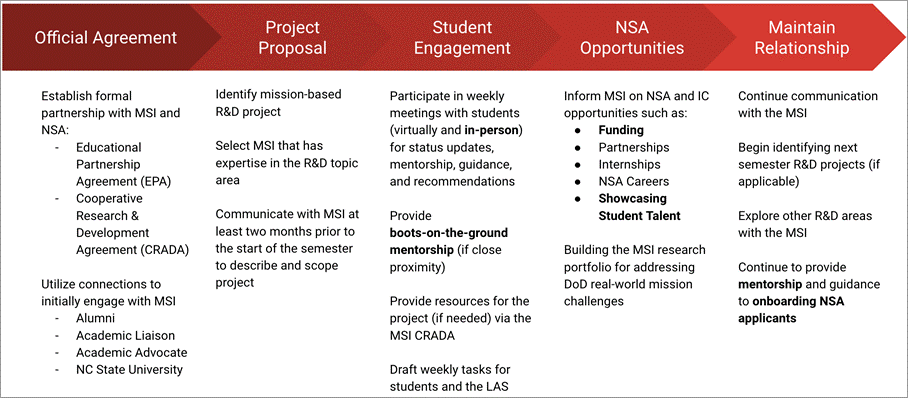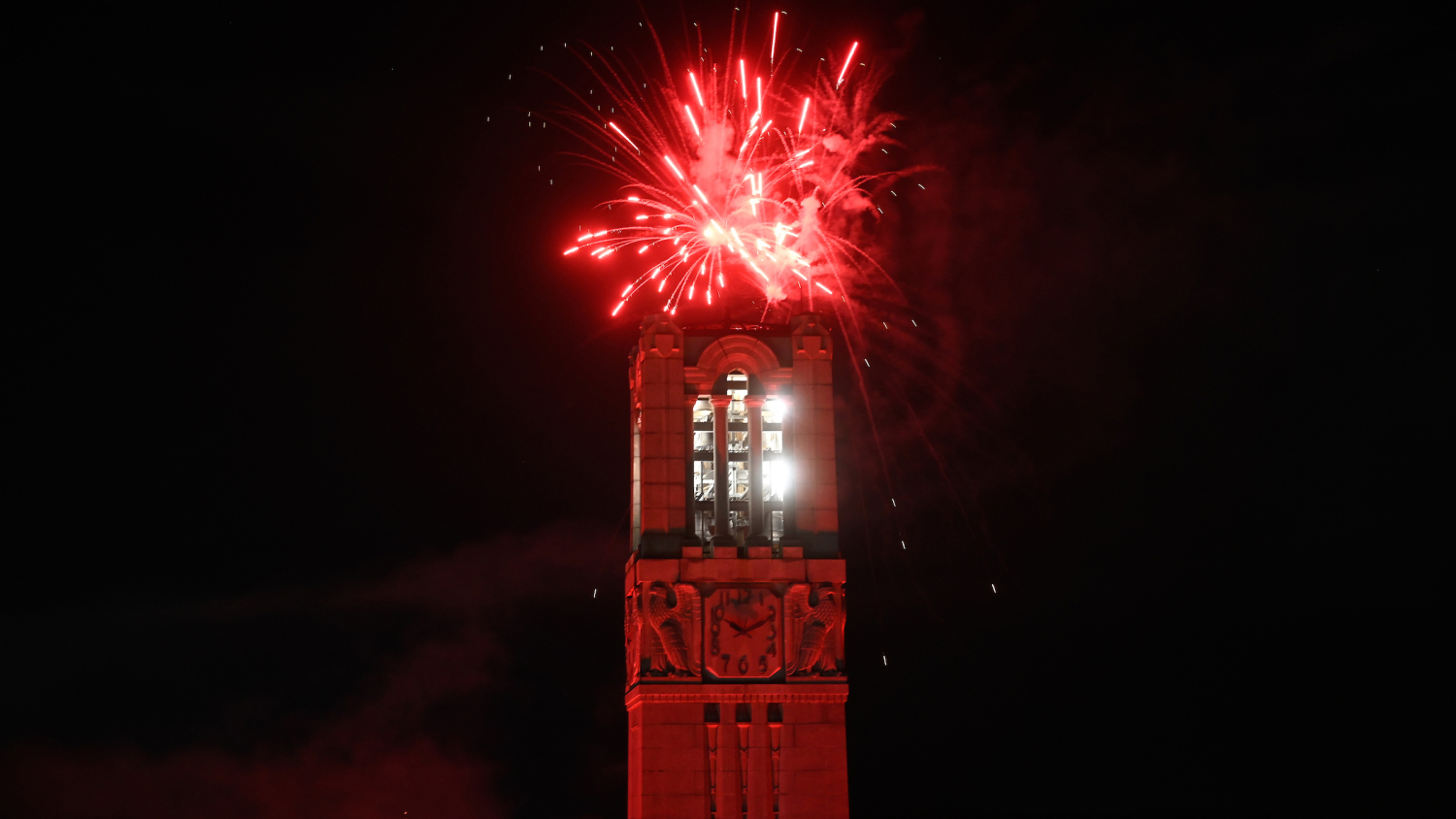Minority Serving Institution Outreach and Engagement at the Laboratory for Analytic Sciences
Felecia ML., James S., Donita R.

The Objective
Develop a process at the Laboratory for Analytic Sciences (LAS) for fostering collaborations with underrepresented minority-serving institutions (MSIs) in North Carolina on research and development (R&D) projects, supporting one of NSA’s top priorities of building and sustaining a diverse, expert workforce that continues to provide the nation with competitive advantages.
The LAS/MSI partnerships provide opportunities for subject matter experts at MSIs to work collaboratively on research projects and capabilities of significant size and impact to benefit the National Security Agency (NSA). These partnerships can help attract untapped talent with diverse backgrounds and skill sets, helping to diversify the NSA workforce. The partnerships also enhance research infrastructure and expertise at MSIs and establish a foundation for continued engagement with the NSA. Being close to many institutions in North Carolina, the LAS team sought to strengthen the NSA’s partnership with underrepresented MSIs for the mutual benefit of MSIs and the NSA mission customers.
The MSIs include:
- Alaska Native and Native Hawaiian-Serving Institutions,
- Asian American and Native American Pacific Islander-Serving Institutions (AANAPISI),
- Native American-Serving Nontribal Institutions (NASNTI),
- Hispanic-Serving Institutions (HSI), Historically Black Colleges and Universities (HBCU),
- Predominantly Black Institutions (PBI), and
- Tribal Colleges and Universities (TCU).
Figure 1 (below) displays the MSIs located in North Carolina, with the LAS centrally located in Raleigh. Note that there are two MSIs near military bases (i.e., the red boxes in Figure 1): Elizabeth City State University (Base Elizabeth City) and Fayetteville State University (Fort Liberty). This is key because those MSIs have a large military student population (where some students may have existing clearances); in turn, a higher percentage of research at these MSIs is Department of Defense (DoD) focused.

White – Institutions hold open grants
Blue – History Black Colleges & Universities (HBCUS)
Green – Hispanic Serving Institutions (HSIS)
Orange – Native American Serving Non-Tribal Institution (NASNTIS)
Purple – Predominantly Black Institutions (PBIS)
Gray – Military base
The 2023 Minority Serving Institution Partnerships
In 2023, the LAS developed two new partnerships with MSIs in North Carolina: Winston-Salem State University (WSSU), which is an HBCU, and The University of North Carolina at Pembroke (UNC at Pembroke), which is a NASNTI. Both WSSU and UNC at Pembroke partnered with the LAS on research projects that can assist the NSA mission at an unclassified level. The partnerships were formed with WSSU and the UNC at Pembroke through the Minority-Serving Institution Cooperative Research and Development Agreement (MSI CRADA), thus allowing the LAS to support building and sustaining a diverse and expert workforce at the NSA. The Office of Research and Technology Applications (ORTA) created the MSI CRADA, which provides MSIs a formal means to work with the NSA on R&D topics such as Internet of Things, Cyber Security, and Secure Composition and System Science.

As an example of utilizing the MSI CRADA to collaborate with WSSU and the UNC at Pembroke, the LAS team devised a mission-relevant use case for senior design, capstone, and graduate students while leveraging the expertise of the professors as co-advisors. The objective of the project was to develop techniques to synthesize new knowledge graphs (KGs) to represent a variety of cyber scenarios. For the duration of both the Spring and Fall 2023 semesters, the LAS team provided weekly mentorship to the students virtually and in-person. For more information about the outcome of the project, please refer to the 2023 LAS project, “Synthetic Cyber Knowledge Graphs.”
It is imperative to note that visiting MSIs in-person at least 3-4 times a year (in addition to virtual communication by email or video) can significantly strengthen the relationship between the MSI and NSA. For example, the LAS has visited Fayetteville State University, WSSU, and the UNC at Pembroke, which allowed for (1) providing mentorship to the students on collaborative LAS research projects; (2) briefing students about NSA career opportunities; (3) meeting with the MSI leadership to learn more about their academic and research initiatives.

Also, in-person visits provide the LAS an opportunity to meet and inform MSI leadership about the NSA research initiatives and opportunities, such as participating in the NSA codebreaker challenges and highlighting current and future opportunities for student engagement.
As a result of both virtual and in-person visits, there was an increase among participating MSIs and their students in:
- NSA career opportunities (Figure 2);
- LAS project participation;
- fostering additional partnerships with organizations throughout the NSA.

Additionally, the LAS provided the students an opportunity to showcase their talents to the NSA and Intelligence Community (IC). Students and professors have visited the LAS to brief the outcomes of their research to multiple organizations throughout the NSA and at the annual LAS Symposium. To prepare for the briefings, the LAS team worked with the students to assist in creating their presentations, thus building students’ confidence and enhancing their presentation skills. These avenues can provide the students and MSIs the visibility to showcase their talents in AI/ML, critical thinking, R&D expertise, applying advanced technological approaches to problem-solving, and developing a capability of immediate need to the NSA.
The MSI Outreach and Engagement Model at the LAS
In 2022, the LAS partnered with the HBCU, Fayetteville State University (FSU), via the MSI CRADA (which the LAS helped to establish with FSU in May 2022) on a LAS-devised senior design project due to their research expertise in computer vision and DoD partnerships external to the NSA. The FSU/LAS partnership opened many doors for FSU and led to the LAS devising a repeatable outreach model (Figure 3) that can be used to engage, strengthen relationships and ultimately partner with other underrepresented MSIs through research. As such, this model has been applied to FSU, WSSU, and UNC at Pembroke.
Some key factors in the LAS outreach and engagement model are:
- Leverage the MSI CRADA to:
- Establish a formal and long-term partnership with MSIs
- Provide resources if needed
- Protect proprietary information during collaborative R&D
- Devise R&D projects that are of mutual benefit
- Provide ongoing mentorship to students
- In-person visits help to strengthen relationships with MSIs
- Inform MSI on various NSA opportunities
- Develop ways to showcase student talent and R&D expertise to the IC
- Maintain an ongoing relationship with MSIs

Long-Term Academic Partnerships (Mutual Benefits)
The LAS partnership with MSIs in North Carolina exposed students and faculty to real-world mission challenges, which allowed them to develop interests in continuing collaboration and/or employment opportunities with the NSA. The LAS is also identifying those MSIs with expertise in specific research areas that could be of mutual benefit to the NSA.
Fayetteville State University
In 2022, the LAS partnered with Fayetteville State University (FSU) via the MSI CRADA on a LAS-devised senior design project to detect rare/uncommon objects in images and videos. What began as a senior design project led to the foundation for further collaboration opportunities between FSU and the LAS on computer vision analysis. FSU applied and was selected as a 2023 and 2024 LAS funded performer, continuing its research on rare/uncommon object detection to assist the NSA mission while getting exposure to their research in computer vision analysis.
Winston-Salem State University
After the LAS partnered with WSSU senior design class in Spring 2023 via the MSI CRADA, WSSU developed an interest in continuing collaboration with the NSA. In Fall 2023, the LAS hosted a visit for WSSU Department Chair of Computer Science, faculty, students, and the NSA academic liaison to provide an overview and describe research areas that could be mutually beneficial, such as collaborating on R&D projects related to data science that can utilizing the expertise from WSSU’s Interdisciplinary Data Science curriculum.
The University of North Carolina at Pembroke
The UNC at Pembroke received their Center of Academic Excellence in Cyber Defense designation in early 2023. As a CAE-CD institution, the UNC at Pembroke will play a critical role in addressing the growing demand for skilled cybersecurity professionals. The university will continue to enhance its cybersecurity programs and initiatives to ensure that students are well-prepared to tackle the evolving challenges in the field.
With the UNC at Pembroke’s expertise in cybersecurity, the LAS assisted with establishing a MSI CRADA with the institution, which will provide additional partnership opportunities in the cybersecurity realm. Because of the collaboration with the LAS in Fall 2023, UNC at Pembroke is executing the LAS Synthetic Cyber Knowledge Graph project, along with applying deep learning techniques, as part of their 2024-2025 Cyber Capstone Course for further cybersecurity research.
Next Steps (FY24)
The LAS will continue to apply and refine the MSI outreach and engagement model to strengthen relationships, partnerships, and leverage the expertise of MSIs in North Carolina by exploring additional R&D opportunities such as:
- Cultural Studies and Language (Fayetteville State University)
- Unmanned Aircraft Systems Program (Elizabeth City State University)
- Cybersecurity (The University of North Carolina at Pembroke and Fayetteville State University)
- Data Science (Winston-Salem State University)
In 2024, the LAS will:
- Continue its partnership with FSU as a 2024 LAS performer, refining joint research on detecting rare/uncommon objects in images and videos
- Partner with the UNC at Pembroke cybersecurity capstone course through the MSI CRADA to continue enhancing the Synthetic Cyber Knowledge Graph project
- Continue to build relationships and explore R&D opportunities to promote untapped talent at underrepresented MSIs in North Carolina
- Building a pipeline of women and minority STEM candidates
Contact Information
For more information about the MSI outreach and engagement process at the LAS, please contact the LAS Government team below.
- Felecia ML. (fdvega@ncsu.edu)
- James S. (jtsmit23@ncsu.edu)
- Donita R. (drobins7@ncsu.edu)
- Categories:


